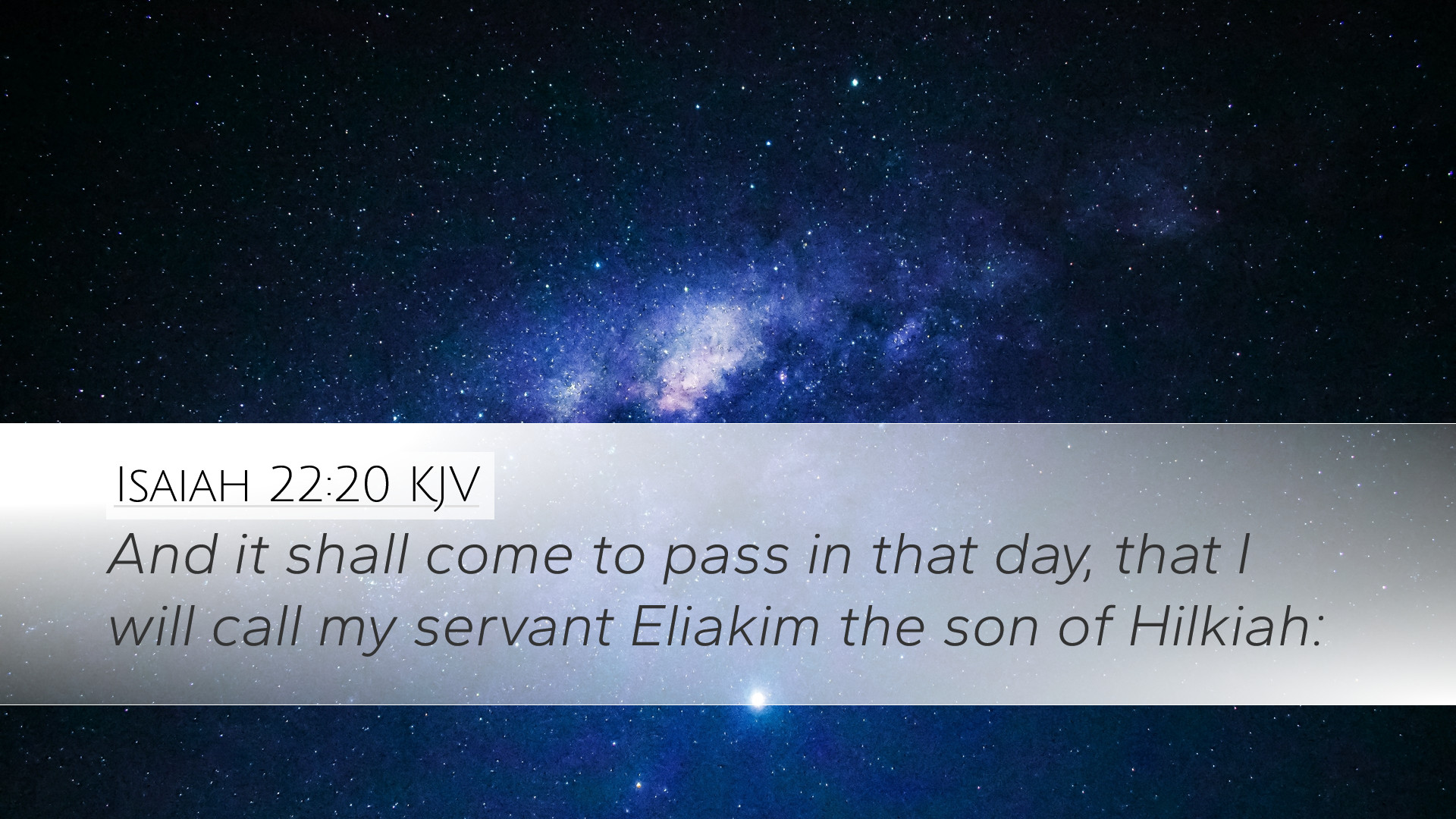Commentary on Isaiah 22:20
Verse: "And it shall come to pass in that day, that I will call my servant Eliakim the son of Hilkiah:" (Isaiah 22:20, KJV)
Introduction
The prophetic book of Isaiah contains rich themes of judgment, restoration, and divine sovereignty. Isaiah 22:20 marks a significant moment within a larger narrative focused on the fate of Jerusalem and its leadership. This commentary synthesizes insights from public domain sources, particularly drawing from Matthew Henry, Albert Barnes, and Adam Clarke, providing a layered understanding of this verse that targets pastors, students, theologians, and Bible scholars.
Contextual Background
Matthew Henry notes that Isaiah prophesied during a tumultuous time for Judah, dealing with both internal corruption and external threats. The chapter primarily deals with judgment on the leaders of Jerusalem and introduces Eliakim, a figure signifying hope and restoration.
Albert Barnes emphasizes the term "that day," which often denotes a specific point in prophetic revelation where God's action becomes evident. This day can refer to immediate events or broader eschatological implications. Understanding the historical context involving the Assyrian threat is crucial for interpreting Eliakim’s role.
Eliakim: A Servant of God
Eliakim's Selection:
In Isaiah 22:20, God designates Eliakim as His servant, suggesting divine appointment and authority. Adam Clarke clarifies that the name "Eliakim" means "God will raise up," indicating a providential elevation by God for a significant task.
- Divine Purpose: This selection highlights God's sovereignty in choosing leaders and underscores the purpose-filled life of Eliakim.
- Contrast with Shebna: This choice contrasts sharply with Shebna, who was seen as corrupt and self-serving, thus illustrating the consequences of leadership that strays from God’s design.
Spiritual Implications of Leadership
Characteristics of a Godly Leader:
Commentaries suggest that Eliakim embodies the traits of a righteous leader. Matthew Henry discusses the moral qualifications necessary for anyone standing in the positions of authority in God's kingdom.
- Integrity: Leaders should demonstrate integrity, serving not for personal gain but for the welfare of those they lead.
- Faithfulness: Faithfulness to God's commands is paramount to effective leadership.
- Humility: True greatness in leadership comes from a humble reliance on God.
Covenant and Authority
Isaiah 22:20 reflects themes of covenant and authority within the framework of God’s intentions for His people. Albert Barnes elaborates that Eliakim’s appointment is consistent with the Davidic covenant, a promise of enduring leadership in Jerusalem. This covenantal relationship showcases God's commitment to His people and His plan for governance.
Messianic Fulfillment
Furthermore, there is a typological connection to Christ as the ultimate servant leader. Adam Clarke points out that Eliakim serves as a foreshadowing of the Messiah, highlighting the attributes of stewardship and the Kingdom of God. Eliakim is not merely a historical figure but also a type of the servant who would fulfill the law and manifest God's kingdom. This adds depth to the verse, pointing beyond immediate historical context to the fulfillment found in Jesus Christ.
Application for Modern Readers
This passage calls modern leaders, especially in the context of the Church, to reflect on their leadership dynamics. The following applications can be drawn:
- Servant Leadership: Emulate Christ’s example of servant leadership, emphasizing service over authority.
- Seeking Divine Guidance: Leaders should continually seek God's wisdom and direction in all decisions.
- Accountability: Just as Eliakim was accountable to God’s standards, Church leaders must remain accountable to biblical teachings.
Conclusion
Isaiah 22:20 serves as a powerful reminder of God's sovereignty in appointing leaders and the necessity for faithful, godly leadership in all realms of society. The insights gleaned from Matthew Henry, Albert Barnes, and Adam Clarke encourage a holistic understanding of the spiritual and practical dimensions of leadership.
As congregations and communities strive for justice and integrity, examining the life and appointment of Eliakim reveals both the seriousness of leadership roles and the hope found in God's redemptive plans for His people.


